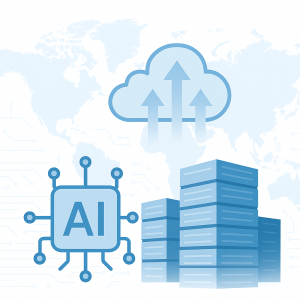
In the first half of April 2025, the largest cloud service providers—Google, AWS, and Microsoft—announced significant updates that could shape how federal agencies plan and execute cloud and AI initiatives. Here’s what government IT leaders and program managers should know:
- Google Cloud Scales Up AI for Mission Use
At its annual Google Cloud Next conference, Google introduced powerful new tools and infrastructure designed to accelerate AI adoption:
-
- Next-Gen AI Infrastructure: New chips and storage systems are optimized for AI workloads, offering better performance and lower latency—key for training and running large models.
- Expanded Model Access: Updates to Gemini (Google’s AI platform) enable more sophisticated reasoning, faster performance, and real-time data streaming.
- AI Agents for the Enterprise: Google is launching tools to help teams build and use AI-powered agents across their organizations—even without writing code.
- Secure Deployment Options: Their Distributed Cloud offering allows for AI deployment in air-gapped or on-prem environments, supporting federal security requirements.
Why It Matters: This suite of announcements positions GCP as a strong contender for large-scale AI projects.These updates position Google Cloud as a strong option for secure, scalable AI initiatives across civilian and defense agencies.
- AWS Slashes Storage Costs and Expands Model Options
Amazon Web Services (AWS) made strategic moves that improve both affordability and AI capabilities:
-
- Lower Storage Costs for S3 Express: AWS cut the price of its high-performance storage tier by up to 85% for some operations—freeing up budget for other mission needs.
- New AI Model Access: AWS became the first to offer Mistral AI’s powerful multimodal model (Pixtral Large) on its Bedrock platform, enabling advanced analysis of text, images, and code—all in a fully managed environment.
Why It Matters: These changes make it more cost-effective for agencies to support data-heavy workloads and adopt cutting-edge AI models without needing to manage the backend complexity.
- Microsoft Enhances AI Operations, Security, and Identity Management
Microsoft focused on helping organizations operate more efficiently and securely:
-
- Copilot in Azure GA Now Available: This AI assistant helps administrators streamline cloud management tasks, saving time and reducing errors.
- Critical Security Patches Released: Microsoft addressed 134 security vulnerabilities—11 of which were critical—including a zero-day already being exploited.
- Major Identity and Access Changes: Microsoft Entra (formerly Azure AD) is undergoing changes that require updates to multi-factor authentication, external user access, and permissions management.
Why It Matters: Azure Copilot offers a potential productivity boost for teams managing Azure resources. The critical security patches necessitate immediate action within federal environments. The significant changes in Microsoft Entra require careful planning and potential reconfiguration of identity and access management strategies for applications and users.
Takeaway for Agencies:
These announcements reflect an accelerating push toward AI-enabled operations, tighter security, and more cost-effective cloud usage. Agencies planning or running cloud-based programs should assess how these changes could support mission outcomes, improve cybersecurity, and optimize spending.